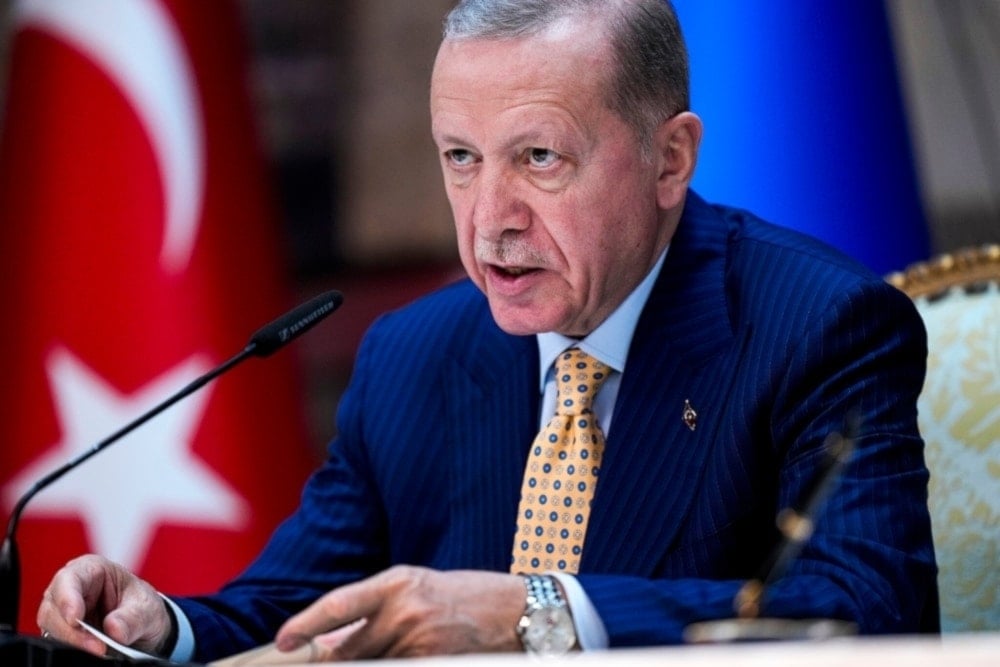'Target is Damascus,' Erdogan hopes 'smooth march' on Syria's capital
Turkish President Recep Tayyip Erdogan has discussed key regional matters, focusing on Syria's ongoing crisis.
-

Turkish President Recep Tayyip Erdogan during talks at Dolmabache Palace in Istanbul, March 8, 2024 (AP)
Turkish President Recep Tayyip Erdogan addressed key regional issues on Friday, including the ongoing developments in Syria, expressing hope for "a smooth continuation of anti-regime forces’ advance toward Damascus."
“…Idlib, Hama, Homs, and the target, of course, is Damascus. The opposition's march continues. Our wish is that this advancement in Syria continues without accidents or disasters,” Erdogan stated to reporters following Friday prayers in Istanbul.
Erdogan also voiced dissatisfaction with Syria’s leadership, saying, “We made a call to (Bashar al) Assad. We said: 'Come, let's determine the future of Syria together.' Unfortunately, we did not receive a positive response to this.”
Turning to Lebanon, Erdogan highlighted the severe challenges the country is facing. “Lebanon is in a very difficult situation. Everything is in ruins. There are requests for help. During a time when the world is silent, we will continue our assistance,” he remarked.
The Turkish president called for unity in Lebanon and reaffirmed Turkiye’s dedication to supporting the crisis-hit nation during these difficult times.
This comes shortly after the Syrian Ministry of Defense announced a series of coordinated artillery, missile, and aerial strikes, backed by Russian air support, targeting militant vehicles and gatherings in the northern and southern countrysides of Hama. The Ministry confirmed that the strikes resulted in dozens of casualties among the militants.
Solutions in Syria needed to end terrorism: Putin to Erdogan
Russian President Vladimir Putin spoke with Turkish President Recep Tayyip Erdogan on Tuesday, during which they discussed the escalating situation in Syria.
According to the Kremlin, Putin emphasized the urgent need to halt the terrorist aggression against the Syrian state by extremist groups and to provide full support for the efforts of legitimate authorities to restore stability and constitutional order across the country.
The statement also noted that the leaders expressed support for strengthening bilateral relations and cooperation within the Astana process. They highlighted the crucial role of continued close coordination between Russia, Turkey, and Iran in stabilizing and normalizing the situation in Syria.
The statement highlighted that the two presidents would work to maintain their contacts as they work to find steps to de-escalate the situation in Syria. It concluded by noting that several key issues were discussed regarding the further development of mutually beneficial Russian-Turkish cooperation, with an emphasis on trade, economic, and energy matters.
Erdogan stresses firm stance against PKK
For his part, Erdogan emphasized during the conversation that Ankara supports Syria's territorial integrity and believes that Damascus requires a political solution, according to a statement from the Turkish presidency.
He emphasized the importance of creating more room for diplomacy in the region and stressed that Syria must be included in the political solution process.
Erdogan further said that the most important issue regarding recent events in Syria is that civilians must not be harmed and that Syria should not become unstable. He added that Turkiye is doing everything in its power to ensure calm in Syria.
The statement emphasized that Turkiye will maintain a firm stance in its fight against the Kurdistan Workers' Party (PKK) and its affiliates, who are attempting to exploit the recent events in Syria.
On Saturday, Russian Foreign Minister Sergey Lavrov held separate phone conversations with his Turkish and Iranian counterparts to address the escalating violence in Syria's provinces of Aleppo and Idlib, as reported by RIA Novosti.
According to a statement from the Russian Foreign Ministry, both diplomats conceded the urgent need for coordinated action to stabilize the situation and reaffirmed the role of the Astana process as the primary framework for dialogue and conflict resolution.
In a separate conversation, Lavrov and Iranian Foreign Minister Abbas Araghchi reaffirmed their commitment to Syria’s sovereignty and territorial integrity. They condemned the recent surge in terrorist activity in Aleppo and Idlib, which Araghchi attributed to US-Israeli plans to destabilize the region.
The two ministers called for a comprehensive review of the situation within the Astana framework and pledged to intensify joint efforts to counteract the rise in militant activity.

 4 Min Read
4 Min Read








